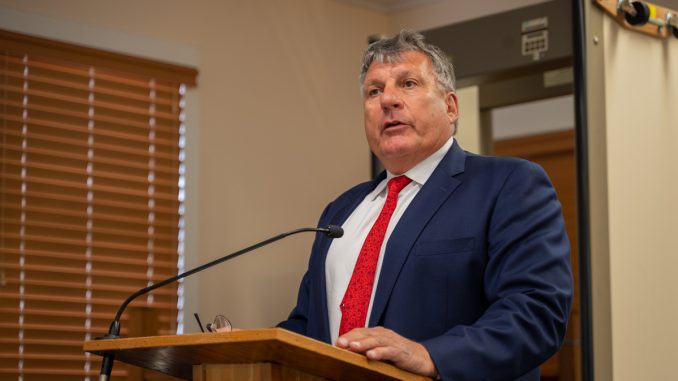
The Southold Town Board voted Tuesday evening to extend its widely-supported moratorium on battery energy story systems, commonly know as BESS, for an additional year.
The board previously approved a 12-month moratorium on BESS facilities last year, about eight months after Albany-based Key Capture Energy proposed building a 60-megawatt BESS facility on 27 acres along Oregon Road in Cutchogue. KCE’s proposal stirred controversy due to its location, potential environmental impacts and safety concerns, including local fire departments’ ability to effectively respond to emergencies at the facility.
BESS facilities store energy generated by renewable technologies, such as solar panels and wind turbines, for future consumption. The systems are currently not permitted under Southold Town code, but the technology could potentially become a key component of the region’s energy supply.
The town board hosted a public hearing before casting a 5-0 vote to approve the motion, with councilmember Louisa Evans absent. A handful of residents spoke in-person and over Zoom in favor of extending the moratorium, citing similar concerns aired last year when the board first voted on the ban.
“There are many issues that have not yet been considered,” said Cutchogue resident Alix O’Mara, one of approximately forty homeowners living on or near Oregon Road who formed Friends of Oregon Road which last year collected roughly 1,100 signatures on a petition supporting the BESS ban. “If there were a fire at the Oregon Road facility, how would the town handle the evacuation zone, which would presumably include the transfer station as well as the closure of Route 48 and the many nearby homes?,” Ms. O’Mara said.
The issue has drawn regional attention over the past year. The Southampton Town Board enacted a six-month BESS moratorium last August and renewed it for an additional six months on Feb. 15. Following a trio of fires at BESS facilities in East Hampton, Warwick in Orange County and Chaumont near the Canadian border within a two-month span, Gov. Kathy Hochul formed an Inter-Agency Fire Safety Working Group to examine the issue. Last month, the group released 15 draft recommendations to bolster safety at BESS facilities. According to a release from the governor’s office dated Feb. 6, the working group’s recommendations focused on “lithium-ion BESS facilities exceeding 600 kilowatt-hours (kWh)” and would be considered for inclusion in the next edition the statewide fire code.
Among other measures, the report recommends authorizing municipalities to require BESS developers to pay for a peer-reviewed study of all projects, expand explosion controls, install security and safety monitoring systems at all facilities and ensure that trained personnel could be dispatched and on site within four hours of an emergency to aid local first responders.
The board’s moratorium, which was set to expire April 11 and will now run through April 11, 2025, allowed for the creation of a seven-member BESS Task Force charged with researching the battery storage industry to identify key safety concerns and existing regulations. Task force member Michael Macco said the board can expect a report from the volunteer group “probably in the next 30 days.”
“It’s been a very active committee, we’ve been meeting weekly and we email almost daily,” said Mr. Macco, one of four task force members who attended the Tuesday hearing. “We have been working very hard on this matter … We support the extension of the moratorium for the one-year period of time. There’s still more work that needs to be done.”

